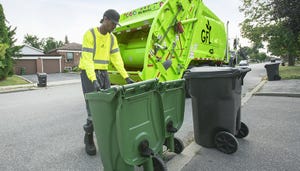Eye on Collection Wins Contract, An
November 1, 2000
Aaron DeWeese
"Big Brother" wasn't a hit television show for CBS, but a variation on the concept has given one Texas hauler the competitive edge. By installing video cameras on its trucks, Texas Disposal Systems (TDS), Austin, Texas, convinced the city of Georgetown, Texas, that the company could bring quality service and accountability to its garbage collection program if it were awarded the hauling contract.
In 1998, Georgetown was looking for a private hauler to collect garbage at the city's 10,506 residential and 433 commercial accounts for an initial term of four years with options to renew up to 10 years.
Georgetown officials left the request for proposal guidelines open-ended, allowing private haulers to devise innovative ideas to win the contract.
"Working with the city council, we had a process where the quality of service was weighted heavier than the price," says Verna Browning, director of community services for Georgetown.
Several private haulers submitted proposals, but TDS proposed installing video cameras on its garbage trucks to ensure that Georgetown could monitor every aspect of the collection and disposal process.
Although TDS was not the lowest bidder, it won the contract.
"There was a lot of competition for the contract, but I think TDS was one of the only companies that was interested in trying out this technology," says Gary Hertel, shop foreman at the TDS Georgetown facility. "The [cameras] cost about $2,500 per truck, and there are eight trucks. This is a substantial investment for any hauling company.
Many people were skeptical that the video cameras would provide benefits that would outweigh the initial costs, Hertel says. However, "the cameras are set up almost identical to those in police cars and have the clarity to see what's really happening," he says.
Once TDS won the contract, it worked with the camera's supplier, Safety Vision, Houston, to have the truck cameras fully operational by the first day of service. TDS installed industrial-grade VCRs, which plugged into its trucks' existing onboard Clarion cameras.
The VCR was programmed to include driver information and to record signal indicators such as stoplights, brakes and warning lights. The VCR also was small enough to fit in the truck cab and record up to eight or 24 hours on a single VHS tape.
"On the rear loaders, we have a camera above the hopper that shows the workers dumping the trash," Hertel says. "You actually can see the cart as it's dumped into the hopper and when it comes back out. Also, you can see the workers working."
Cameras also are mounted behind the driver's cab on TDS' recycling trucks to provide a full view of all the compartments. According to Hertel, video monitoring ensures the paper is being sorted properly.
Cameras that are mounted on the front loaders, looking out of the front windshield, record the serial number on the customer's dumpster, Hertel says.
"Drivers receive a new tape every day. Tapes are dated and set on a 24-hour play system because [many] of the routes are longer than TDS' regular play system. So it's actually sped up as you watch the tape," Hertel says.
While Browning admits the city does not review tapes regularly, the new system has provided Georgetown with a layer of accountability.
"We were going to try to review tapes monthly, but it hasn't turned out to be that frequent," Browning says, "It's more periodic as opposed to routine."
TDS maintains a video library, filing tapes for two months before recycling them.
"There's a time and date on every tape so if Joe's Pizza says, `My trash wasn't collected on Tuesday,' you can look at Tuesday's tape and check the serial number on the dumpster to figure out whether the trash was dumped in the truck or not," Hertel says.
The onboard video system also has helped monitor hazardous waste. In one case, the system recorded a household that improperly disposed of enough toxic waste to make TDS employees ill, he says.
The cameras also have proven useful in potential legal cases. For example, TDS avoided a hefty lawsuit when a driver rear-ended a garbage truck. The frustrated driver accused the truck driver of backing into her car. But the accident was recorded on video, the driver was issued a ticket, and her insurance company paid for damage to her car.
According to Hertel, TDS does not use the cameras to monitor its employees constantly, but installing the equipment has improved service quality.
"We try not to use the system to hold workers accountable because not everyone likes to be video taped," Hertel says, "but we have [used the cameras to train] new employees who aren't used to working on the back of garbage trucks."
For example, if new employees are taking too many steps to complete a task, TDS uses the tapes as a teaching tool, he says.
TDS employees work safer and are more likely to pick up trash that spills, Hertel adds. So although the company doesn't have productivity statistics, he believes more tasks are being performed properly now than when the cameras were not in place.
"This almost assures that every piece of paper that gets dropped, gets picked up," Hertel says. "As far as quality service, it helps."
You May Also Like


